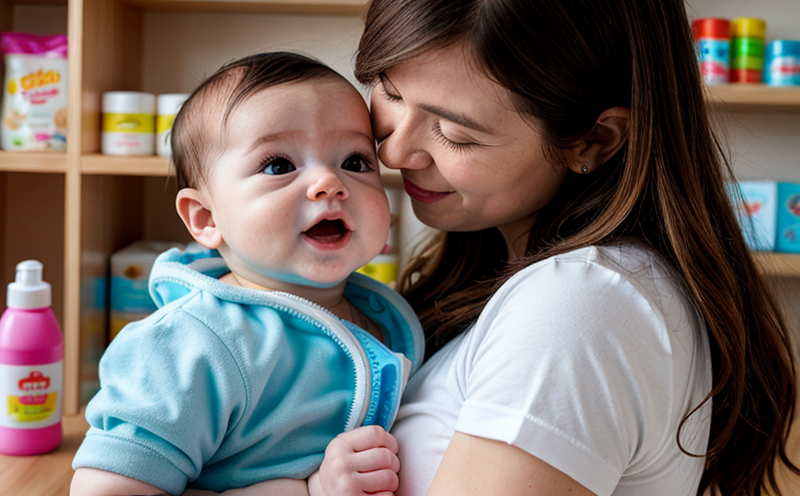Antimicrobial Coating Efficacy Testing in Baby Utensils
The testing of antimicrobial coatings on baby utensils is a critical component in ensuring product safety and quality. This service focuses on evaluating the effectiveness of antimicrobial treatments, which are increasingly used to prevent bacterial contamination and enhance hygiene during feeding and eating processes for infants. The primary goal is to ensure that these products meet stringent safety standards while providing significant health benefits.
Antimicrobial coatings have gained popularity due to their ability to inhibit or kill microorganisms such as bacteria, fungi, and viruses on surfaces where babies frequently come into contact. This service addresses the need for rigorous testing to confirm the efficacy of such coatings in real-world conditions that mimic typical use scenarios. Compliance with international standards like ISO 22196:2011 is essential for validating antimicrobial claims.
The testing process involves several key steps, including sample preparation and inoculation with relevant microorganisms. Specimens are then incubated under controlled conditions to observe the growth of pathogens before and after application of the test coating. Real-world usage notes emphasize the importance of conducting tests that simulate actual handling practices by caregivers and infants.
Instrumentation plays a crucial role in accurately measuring the antimicrobial activity, often using quantitative methods such as colony-forming units (CFUs) to determine reductions in microbial counts post-treatment. Reporting is comprehensive, detailing both qualitative outcomes related to microbial reduction rates and quantifiable data derived from CFU analysis.
Quality managers, compliance officers, R&D engineers, and procurement teams benefit significantly from this testing service as it helps them make informed decisions about product development and regulatory compliance. By partnering with a trusted laboratory, stakeholders can ensure that their products not only meet but exceed industry expectations for safety and hygiene.
- Compliance: Ensures adherence to relevant international standards such as ISO 22196:2011.
- Data Accuracy: Provides reliable quantifiable data on microbial reduction rates.
- Real-World Simulations: Tests conditions that closely replicate actual use scenarios for infant products.
- Regulatory Guidance: Helps navigate complex regulatory requirements related to antimicrobial claims.
In summary, the efficacy testing of antimicrobial coatings on baby utensils is vital for maintaining high standards of hygiene and safety. This service not only supports product development but also plays a crucial role in ensuring compliance with global regulations.
Benefits
The benefits of undergoing antimicrobial coating efficacy testing extend beyond mere compliance; they directly impact the quality, safety, and reputation of baby utensils. For manufacturers, this service offers several advantages:
- Enhanced Product Safety: By rigorously testing for microbial reduction, manufacturers can ensure their products are safe from harmful pathogens.
- Improved Hygiene: Effective antimicrobial coatings contribute to better hygiene practices in households with infants or young children.
- Informed Decision-Making: Accurate test results provide valuable insights into product performance and areas for improvement.
- Competitive Edge: Demonstrating a commitment to safety through third-party verification enhances brand reputation and market competitiveness.
For retailers and distributors, these benefits translate into increased consumer confidence, leading to higher sales volumes. Additionally, regulatory compliance reduces the risk of recalls or legal challenges associated with non-compliant products.
Customer Impact and Satisfaction
The impact of antimicrobial coating efficacy testing on customers is profound, particularly for those responsible for purchasing and managing baby products. By ensuring that the products they select meet strict hygiene standards, these professionals contribute to a safer environment for infants and toddlers.
- Increased Confidence: Parents and caregivers gain confidence knowing their children are using safe, hygienic utensils.
- Better Health Outcomes: Reduced exposure to harmful pathogens supports overall health and well-being in young children.
- Ethical Responsibility: Demonstrating a commitment to product safety aligns with ethical business practices, fostering long-term customer loyalty.
- Promotional Opportunities: Brands that invest in comprehensive testing can leverage this information for marketing and promotional purposes, enhancing brand image.
Ultimately, the satisfaction of knowing that every aspect of a product is rigorously tested contributes to higher levels of customer trust and loyalty. This, in turn, supports sustainable business growth and innovation within the industry.
Competitive Advantage and Market Impact
The competitive landscape for baby products is increasingly focused on safety and hygiene. Antimicrobial coating efficacy testing provides a clear advantage by setting benchmarks that competitors must meet or exceed. Here’s how this service impacts the market:
- Market Leader Positioning: Brands that invest in such testing can position themselves as leaders in product safety, attracting more discerning consumers.
- Premium Pricing Justification: Demonstrating robust testing supports higher price points for premium products without compromising on value.
- Regulatory Compliance Leadership: Early adoption of stringent testing protocols positions companies ahead of regulatory changes and industry trends.
- Innovation Incentive: Continuous improvement in test methods drives innovation, leading to safer and more effective products.
The market impact is far-reaching. It encourages all stakeholders—manufacturers, retailers, distributors, and end-users—to prioritize safety and hygiene, thereby fostering a culture of responsibility within the industry. This collective effort contributes significantly to public health and well-being.





